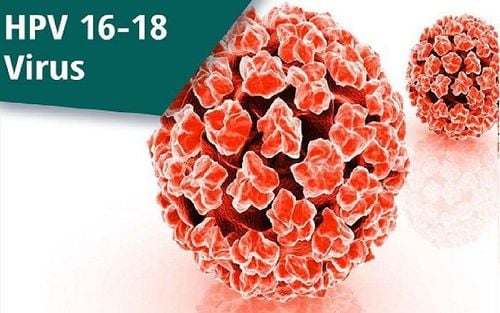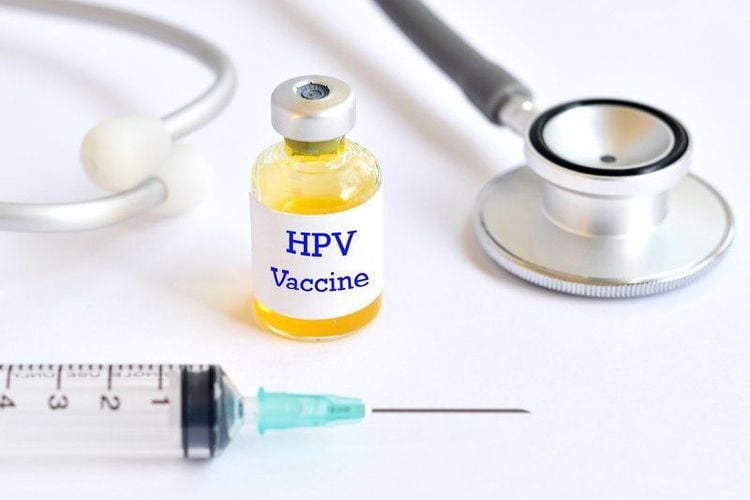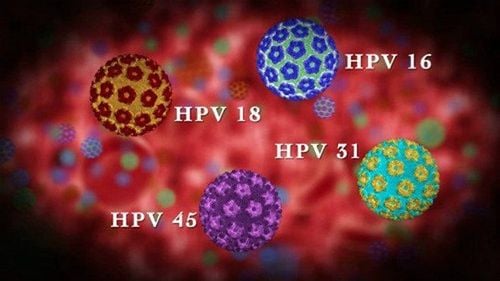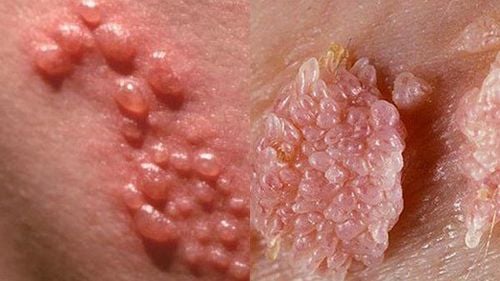This is an automatically translated article.
Professional consultation article by Specialist Doctor I Nguyen Thi Minh Thuyen - Pathologist - Laboratory Department - Vinmec Danang International General Hospital.
The HPV virus is one of the leading causes of other cancers. In particular, cervical cancer is a dangerous disease, seriously affecting reproductive health and potentially causing high mortality in women.
1. What is HPV virus?
HPV stands for human papilloma virus, a large group of related viruses. Each virus in the group is numbered called the HPV type. Most types of HPV cause warts on the skin, such as the skin of the arms, chest, hands, or feet. Other types are found mainly on the mucous membranes of the body. The mucous membrane is the moist surface layer that lines organs and parts of the body that open to the outside, such as the vagina, anus, mouth, and throat. The HPV types on the mucous membranes are sometimes called genital HPV, they usually don't exist on the skin.The common HPV virus is sexually transmitted and there are 200 closely related strains of HPV.
There are two different types of the sexually transmitted HPV virus:
Low-risk HPV types: Some types of HPV can cause warts (papillomas) on or around the genitals and anus on both the genitals and anus. man and woman. Women can also get warts on the cervix and in the vagina. Because these types of HPV rarely cause cancer, they are called “low-risk” viruses. High-risk HPV types: Other types of HPV are called "high-risk" because they can cause cancer in both men and women. Doctors are more concerned about the cellular and precancerous changes associated with these types, since they are more likely to develop into cancer over time. The most common high-risk HPV types are HPV 16 and 18. Although most HPV infections clear up on their own and precancerous lesions can resolve on their own, there is still a risk for infected women. HPV causes chronic and precancerous lesions that will invade and develop into cervical cancer. In women with normal immune systems, it takes about 15-20 years for cervical cancer to develop. But in women with weakened immune systems, such as those with HIV, it takes only 5-10 years to develop cervical cancer.

2. Cancers associated with HPV infection
2.1. Cervical cancer Cervical cancer is the most common type of cancer associated with HPV. Almost all cases of cervical cancer are caused by HPV.Cervical cancer can be detected early and even prevented with routine screening tests. Pap test to look for changes in cervical cells caused by HPV infection.
Cervical cancer is preventable with vaccines and regular screening tests.
2.2. Cancer of the vulva HPV can also cause cancer of the vulva, which is the outer part of the female genitalia. This cancer is less common than cervical cancer.
There is no standard screening test for this cancer other than a routine physical exam.
Trắc nghiệm về virus HPV
Hiện nay, những căn bệnh liên quan đến HPV ngày càng trở nên phổ biến và được cảnh báo nhiều hơn trên các phương tiện truyền thông. Hiểu đúng về HPV sẽ giúp bạn tránh được không ít nguy cơ dẫn đến ung thư các bộ phận sinh dục.
Bài dịch từ: webmd.com
2.3. Vaginal cancer Most vaginal cancers contain HPV. Many vaginal precancerous conditions also contain HPV, and these changes can appear for many years before turning cancerous. These precancerous lesions can sometimes be detected with the same Pap test used to check for cervical cancer and pre-cancer. If a precancerous condition is detected, it can be treated, stopping the cancer before it actually starts.
2.4. Penile cancer In men, HPV can cause penile cancer. This condition is more common in HIV-infected men and men who have sex with men. There is no standard screening test for early signs of penile cancer. Because almost all penile cancers begin under the foreskin of the penis, they can be found early in the course of the disease.
2.5. Anal cancer HPV can cause anal cancer in both men and women, and is more common in people with HIV and in men who have sex with men. Anal cancer screening tests do not. is routinely recommended for everyone. However, some experts recommend an anal cytology test (also known as an anal Pap test because it's the same as the Pap test used for cervical cancer) for people at risk. high risk of anal cancer, including men who have sex with men, people who have had cervical or vulvar cancer, anyone who is HIV-positive and has received an organ transplant .
2.6. Oral and oropharyngeal cancers HPV is found in some oropharyngeal cancers in men and women. Most cancers found in the back of the throat, including the base of the tongue and tonsils, are associated with HPV. These are the most common HPV-related cancers in men. There is no standard screening test to detect these cancers early. However, many cases can be detected early during routine checkups by a dentist, doctor, oral hygienist, or by self-examination.

3. Can HPV infection be prevented?
There is no sure way to prevent infection with all the different types of HPV. But there are things you can do to reduce your risk of getting infected. There are also vaccines that can protect young people from HPV types that are linked to cancer and genital warts.
HPV is passed from person to person through contact with an infected body part. Although HPV can be spread through sexual contact - including vaginal, anal and oral sex - sex is not the only way to get the infection, but skin-to-skin contact. skin with an HPV-infected body area. There may be other ways of contracting HPV that are not yet clear.
HPV can persist for years without causing any symptoms. It doesn't always cause warts or any other symptoms. Someone can have the virus and spread it without knowing it.
3.1. Use condoms Condoms can protect against HPV, but they do not completely prevent infection.
Condoms must be used correctly every time you have sex. Even so, condoms can't provide complete protection because they don't cover every area that could be infected with HPV, like the skin on the genitals or anal area. However, condoms are still useful in protecting against HPV and also help protect against some other sexually transmitted infections.
Use a new condom every time you have sex. A condom should be worn BEFORE genital, oral or anal contact and kept on until sex is over.
3.2. Limiting sexual partners If you are sexually active, limiting the number of sexual partners and avoiding sex with people who have had many other partners can help reduce your risk of exposure to genital HPV.
3.3. Get the HPV vaccine The HPV vaccine can prevent infection with some types of HPV, including those associated with cancer, as well as those associated with anal and genital warts.
The vaccine is approved for use in men and women. They can only prevent HPV infection - but do not help treat an existing HPV infection.
For best effectiveness, HPV vaccine should be given between 9 and 12 years of age. People 13 to 26 years of age who have not been vaccinated or have not received all of their vaccinations should get the vaccine as soon as possible. Vaccinating young people will not prevent as many cancers as vaccinating children and adolescents. The American Cancer Society does not recommend HPV vaccination for people over the age of 26.
4. Treatment of HPV or HPV-related diseases
Cancer is easiest to treat when it's found early - when it's small and before it's spread. Some cancer screening tests can find early cell changes caused by HPV, and these changes can be treated before they become cancerous.With cervical cancer, the World Health Organization (WHO) has recommended a comprehensive approach to prevention and control, including interventions throughout life. It must be multidisciplinary that includes community education, social advocacy, immunization, screening, treatment and care.
The primary way to prevent cervical cancer is to vaccinate girls 9-14 years old.
There are also other preventive measures for boys and girls such as:
Education on safe sex practices including initiation of sex activities. Encourage and provide condoms to those who engage in sexual activity Warnings about tobacco use (which often begins during adolescence) as an important risk factor for cervical cancer and other cancers. Sexually active women should be screened for abnormal cervical cells and precancerous lesions starting at age 30.
If precancerous treatment is needed to remove abnormal cells or lesions, cryotherapy should be used (destroying abnormal tissue on the cervix by freezing).
If there are signs of cervical cancer, treatment options include surgery, radiation, and chemotherapy.

5. Things to remember about HPV
HPV virus is mainly transmitted through sexual contact by direct skin-to-skin contact, oral mucosa, oropharynx or contact with the penis, uterus, vagina, anus of an infected person. Here are things to keep in mind about HPV:
HPV is a very common virus. Most men and women who have ever had sex will get HPV at some point in their lives. There is no cure for HPV, but in most cases it goes away without treatment. HPV infection does not mean you will get cancer. Over time, most HPV goes away on its own. Some people are at higher risk of HPV-related health problems. This includes gay and bisexual men and people with weakened immune systems (including those with HIV/AIDS). Most HPV infections that lead to cancer can be prevented with vaccines. Most cervical cancers can be prevented with regular screening. In short, HPV infection is very common. In most people, the body clears the infection on its own, but sometimes it doesn't go away leading to a chronic or long-lasting infection, especially caused by certain high-risk HPV types, which can cause cancer in the following ways. time. Therefore, cervical cancer vaccination is the most effective way to prevent diseases caused by HPV virus. Prevention is of great significance in preventing abnormal or precancerous cells from progressing to cervical cancer.
Currently, Vinmec Health System is a reputable and reliable cervical cancer vaccination site. Currently, there are two vaccines that are widely used in the world and licensed for circulation in Vietnam as well as in Vinmec: Gardasil and Cervarix.
These two vaccines are given 3 doses over 6 months for each patient. During the time when you have not had enough shots, you should not have sex to prevent HPV infection when the body has not yet created complete immunity. In addition, women who are planning to become pregnant should have a baby at least one month after the last shot to avoid the effects of the vaccine on the fetus.
Especially, when you receive HPV vaccination to prevent cervical cancer at Vinmec, you will receive:
Pre-injection examination and consultation: The doctor does a health screening, asks about your health history, allergies. , have had sex or not. At the same time, the doctor also advises on the origin and effects of each vaccine and chooses a vaccine suitable for the condition, age, and needs of each customer. Vaccination: Vaccines are guaranteed to be optimally stored in the cold chain (cold storage, refrigerators containing vaccines with temperature alarms over the permissible temperature range...). Follow-up after vaccination: Customers are monitored for at least 30 minutes after injection to ensure safety and control side effects (if any). Built an automatic vaccination reminder software that helps customers check their injection history and injection plan via computer or phone.
Please dial HOTLINE for more information or register for an appointment HERE. Download MyVinmec app to make appointments faster and to manage your bookings easily.
References: webmd.com, who.int, American Cancer Society














